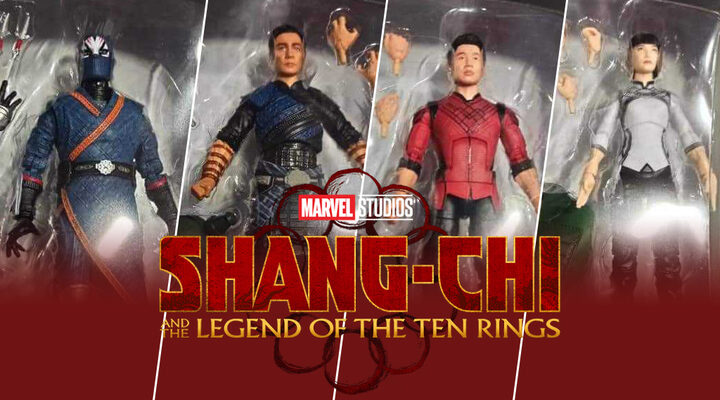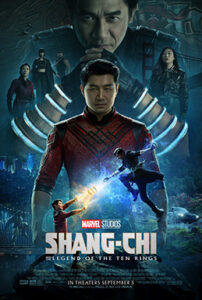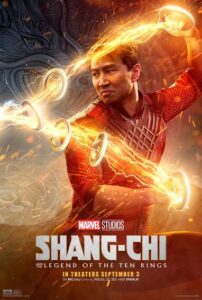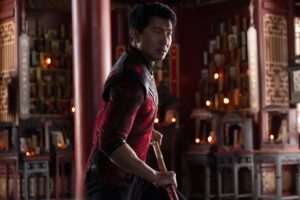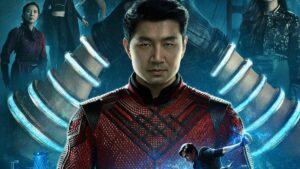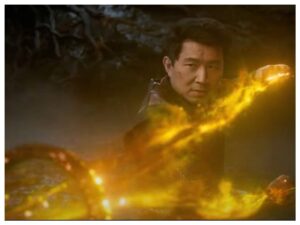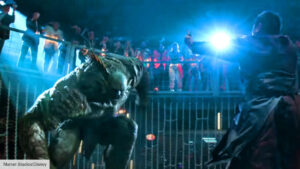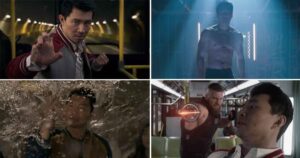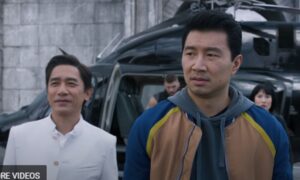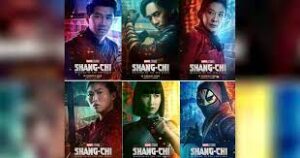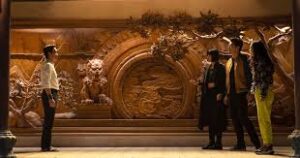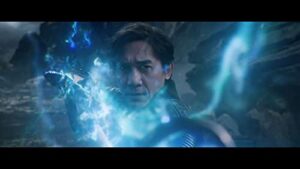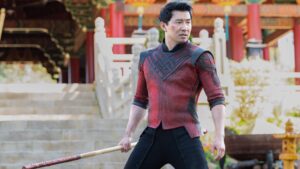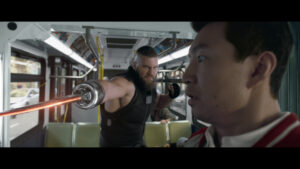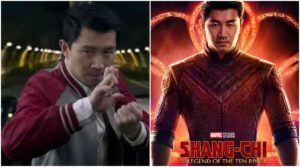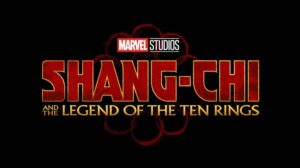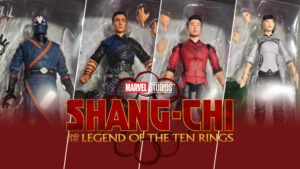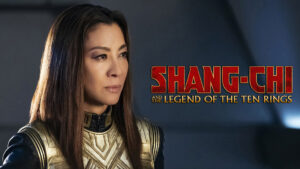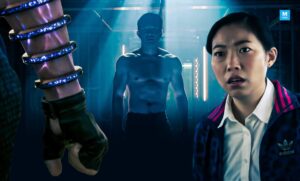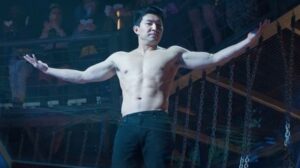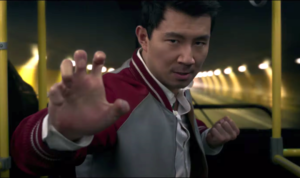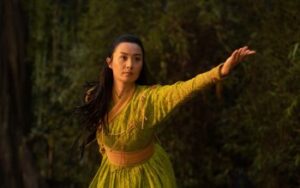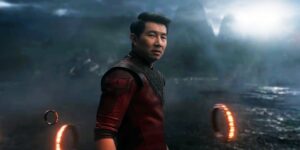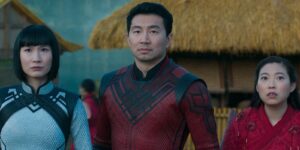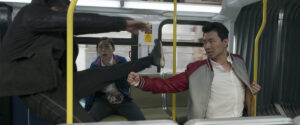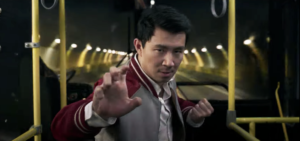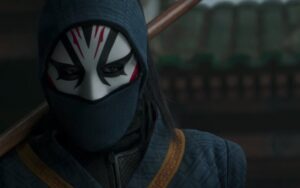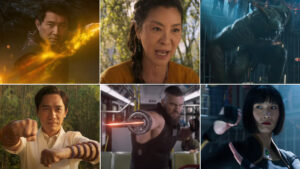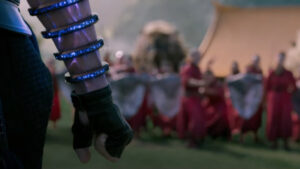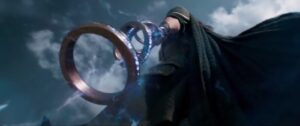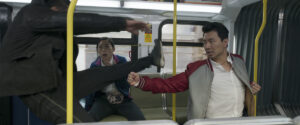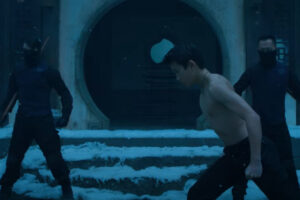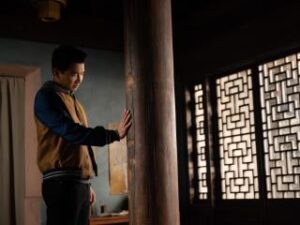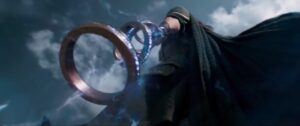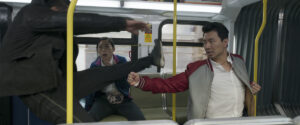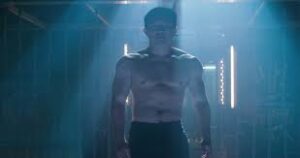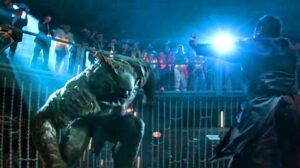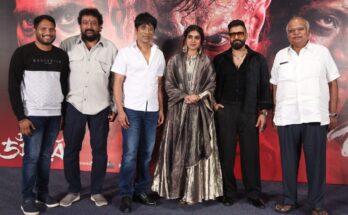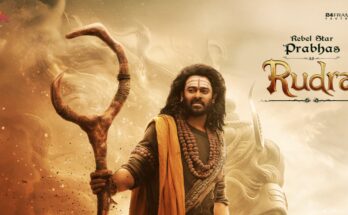Shang-Chi and the Legend of the Ten Rings ( Tamil Dabbed Movie Review )
Cast-;
Simu Liu ,Awkwafina ,Meng’er Zhang ,Fala Chen , Florian Munteanu ,Benedict Wong ,Michelle Yeoh ,Ben Kingsley ,Tony Leung , Etc.
Crew-;
Directer – Destin Daniel Cretton ,Screenplay – Dave Callaham ,Destin Daniel Cretton ,Andrew Lanham ,Story – Dav e Callaham ,Destin Daniel Cretton ,Based on – Marvel Comics,Producer – Kevin Feige ,Jonathan Schwartz Cinem atography – William Pope ,Editer – Nat Sanders , Elísabet Ronaldsdóttir , Harry Yoon ,Music – Joel P. West, Product ion company – Marvel Studios ,Distribute – Walt Disney Studios ,Motion Pictures ,Country – United States, Lang uage – English ,Dabbed In – Tamil P R O – Suresh Chandra ,Rekha and D’one etc.
Story-;
It’s the privilege of so many Chinese Americans to disappoint our parents in ways both big and small, with some of the classics including quitting the piano after years of begrudging lessons, swapping majors from premed to sociology after hitting the wall of o-chem, dating a white person, and not dating a white person. Shang-Chi, the soon-to-be superhero played by Simu Liu in Shang-Chi and the Legend of the Ten Rings, is no different, though the filial angst he contends with is appropriately blockbuster-size. His dad is Xu Wenwu (Tony Leung), the head of a shadowy criminal organization, the Ten Rings, named after the mystical weapons Wenwu always wears on es that have made him immortal and almost impossible to defeat in combat. Trained since childhood to avenge his murdered mother before inheriting both leadership and ownership of the Ten Rings, Shang-Chi has instead opted to hide out in San Francisco, changing his name to Shaun and getting a job as a valet. He works with his be st friend, Katy (Awkwafina), a Cal grad who is equally content to park cars by day and sing karaoke by night, de spite her family’s fond needling.Shang-Chi and the Legend of the Ten Rings, which was directed by Destin Daniel Cretton from a script he wrote with Dave Callaham and Andrew Lanham, is approximately half a good movie, an d it’s never as fleet on its feet as in its first act, when Wenwu gets an introduction out of a hot-blooded wuxia mo vie, only for his son to pop up, the master martial artist as cheerful failson carving out a far less epic life of his ow n.
One of the best sequences is the one in which Shang-Chi first reveals his fight prowess after being attacked on a city bus by a machete-armed mercenary (Florian Munteanu) and his henchmen, the thrill of the action balanced out by the undignified nature of the setting, with its tight quarters and passengers scurrying out of the way or li vestreaming the brawl with color commentary. It’s second only to the setpiece that precedes it by a few minutes, one in which Wenwu’s ongoing quest for power leads him to the entrance of Ta Lo, a magical village where warri ors live alongside creatures out of myth. Guarding the way is a woman named Jiang Li (Fala Chen) who engages Wenwu in a fight that is soon downright sultry, every feint and countered blow serving as an act of flirtation. Li has also been narrating the opening scenes, which we realize right around the time she hands Wenwu’s ass to hi m and admits in voice-over, “That was the first time I met your father.”
Daddy issues have been central to the Marvel Cinematic Universe from its inception, from Tony Stark’s baggage about Howard Stark’s legacy to Loki’s striving to prove himself to his adoptive father, Odin, to Peter Quill’s dis covery of his absentee planet of a parent. But Shang-Chi’s feelings of fear of and reverence for Wenwu don’t just serve as an outsize evocation of a generational immigrant divide — they inform the structure of the movie itself, which is driven more by Wenwu than its title character. And why wouldn’t it be? There’s something cruel about putting Liu, an athletic performer who lacks the timing and the boundless charisma superhero parts all but dem and, up against a legend of Hong Kong cinema who is the very embodiment of what it means to be a movie star. Leung is so irresistibly watchable, bringing so much conflicted presence to his character, that he pulls the camer a’s focus as though exuding a gravitational force. Shang-Chi and the Legend of the Ten Rings may be a super hero origin story in description, but in practice, it’s about Wenwu as a tragic anti-hero, a mesmerizing sociopath who has everything except what he wants: the woman who uncovered his long-buried humanity, the woman he is will ing to destroy the world to bring back. Liu’s shortfalls as a lead actor aside, Shang-Chi isn’t a hopeless addition to the Marvel Cinematic Universe fold.
But the movie feels as racked with a sense of inadequacy about its main character as that main character is abou t himself — to the point that Shang-Chi’s estranged sister, Xialing (Meng’er Zhang), a self-trained martial artist w ho is just as formidable as her brother, is around mainly to express how exasperating it was to see him get all the attention just because he was the son. Cretton, who is still best known for his ridiculously well-cast group-home drama, Short Term 12, does just fine as a first-time director of action, holding his takes a little longer, making the placement of the bodies of his fighters clear, and only toward the end surrendering to the standard incoherent di gital finale (this one has monsters!). In an unexpected but welcome development, the film cribs from Stephen Ch ow as much as it does from Zhang Yimou, and it includes some nifty kung-fu-by-way-of-the-MCU touches — like kitting out members of Wenwu’s underground army with electrified hook swords and deer-horn knives and hav ing the Ten Rings themselves be worn not on the fingers, the way they are in the comics, but around the wrists, st yled after the iron rings used in martial arts.They still look deeply uncool when in use, though, whatever that use is. It says something about Shang-Chi and the Legend of the Ten Rings that it’s never entirely clear what the Ten Rings do, sometimes creating beams of power and sometimes flying through the air themselves.
Mainly, they’re an asterisk marking the film for the superhero genre, rather than just the martial-arts one thoug h the further it gets from being a martial-arts movie, the less engaging it is, bogged down by lore and a need to ra ise the stakes, the expository responsibilities for which fall to poor Michelle Yeoh. Shang-Chi may go through the movie feeling dwarfed by his father, but the movie itself feels dwarfed by its own Asian cinematic touchstones, ac knowledging their achievements and influence and then turning abashedly to a post-credits scene in which a few members of the Marvel Establishment show up to remind us that this was all just part of a larger plan. Shan g-Chi and the Legend of the Ten Rings may give us the franchise’s first Asian American superhero, but what may be the most Asian American thing about it is the way it’s caught between the legacy of its forebears and a still-de veloping sense of self, its protagonist yanked away from that journey and enlisted as the face of the latest repres entational win, without ever seeming entirely decided on what he’s representing.
Watch The Trailor-;
Movie Review-;
Home is where the heart is. Unless you’re Shang-Chi. Then home is where your mother’s mystical secret village and its dragon guardian — is. That’s the case in Marvel’s unsteady “Shang-Chi and the Legend of the Ten Rings,” di rected by Destin Daniel Cretton with an obliging eye toward kung fu cinema, but not much else. Meet Shaun (Sim u Liu). He’s your typical millennial slacker, content with his valet job, where he works with his equally listl es s best friend, Katy (Awkwafina). But Shaun has a secret: his mother (Fala Chen), who died when he was a child, wa s a master martial artist from an alternate dimension. Oh, and dad (Tony Leung) is a conqueror with a secret ni nja army and 10 magical arm rings. And sis, Xialing (Meng’er Zhang), hasn’t been in touch for a while; she’s got an underground “Fight Club”-style empire to rule over. When Shaun, a.k.a. Shang-Chi, receives a cryptic message, he gets pulled into a family reunion and must reckon with his past.“Shang Chi and the Legend of the Ten Rings” is mo re martial arts than Marvel, and that’s a good thing. Even the in-movie winks at the Marvel “stick the super hero landing” formula have grown stale.
“Shang Chi” allows the universe to access all sorts of Chinese folklore, legend, history and myth as well as marti al arts movie tropes.It’s a film of dazzling effects, with the psychotronic bolts and shock-waves emanating from characters’ fingers taking a back seat to some truly Next Gen level water effects, bamboo forest maze scenes, an d a pull-out all the stops Spider-Man-styled battle with bad guys in a moving, articulated (two-coach) bus up and down the streets of San Francisco. Stunning, and fun.But that’s pretty much the high water mark for the Marvel mo ments in this two-hours-plus saga. The air goes out of the balloon, bit by bit, through a Macau fight club and high rise scaffolding chase, and the long middle acts settle into tedium, exposition and entropy.“Kim’s Convenie nce” alumnus Simi Liu was tapped to play the title role, a young guy raised by his supervillain-who-settled-down Dad (Tony Leung of “In the Mood for Love”). His immortal Dad trained him to fight, but Shaun fled China for San Francisco. Now, he happily parks product-placement BMWs at a swank hotel with his joker BFF, Katy (Awkw afi na).But the past — detailed in enchanted opening scenes showing how Xu Wenwu (Leung) met, and fought the wo man (Fala Chen) who became his wife and made him give up his never-ending search for power — catches up with Shaun. Hulking minions, including the magic-blade-armed Razor Fist (Florian Munteanu) catch him on that bus.Sure,
his fight is live-streamed by a net-lump (Zach Cherry) helping Shaun go viral as “Bus Boy.” But the bottom line is, they stole his mother’s jade amulet.He and Katy must dash off to China’s pre-Vegas Vegas — Macau — track do wn his sister (Meng’er Zhang) at her fight club and, after a throwdown in the ring, warn her that her amulet is on evil Dad’s mind.“I don’t know what he wants with them, but we both know it can’t be good.”The jokes, including a light sample of Awkwafina’s wide-eyed, profanity-punctuated gawking, are mostly low-hanging fruit, although th e live-streaming bus fight is a hoot.The dialogue, concocted by a “WW84” scribe, writer-director Destin Dan iel Cretton and his “Just Mercy” screenwriter, is thin on jokes and weak on The Wisdom of the Far East.“You are a product of all who came before you…A blood debt must be repaid by blood.”The inclusion of a cute, headless, win ged fantasy dog critter and retrieving Oscar winner Ben Kingsley from an earlier Marvel movie show that Cre tt on, who also did “Glass Castle” and “Short Term 12,” knew the tone to go for — light — and did his best to find it. But the sitcom-vet leading man is seriously wooden, never showing us much in the way of range, never finding the character’s heart or funnybone.Leung is an actor known for understated, sublimated performances.
That doesn’t get the job done, playing Dad-the-Heavy here. He’s terrific at the fight choreography, but tentative in delivering his lines in English.The over-exposed Awkwafina may have burned through any extra wit she could bring to the set to juice her character.And Munteanu doesn’t have to do much as “Razor Fist,” but he never lets us forget his acting limitations as he does.Bringing in Kingsley suggests the producers knew this wasn’t quite there in the script stage, and he adds a couple of grins. But nothing more.Zhang and Chen make their female leads mo re interesting in performance than any of the menfolk. And that charisma gap is underscored when the effort les sly cool and commanding Michelle Yeoh shows up in the third act. Her presence and gravitas dominates her sce nes and delivers a lot of what the leading men do not, even if that third act plays more like “The Chronicles of Na rnia” than “House of Flying Daggers” — magical creatures galore.Cretton wasn’t a natural choice to helm this, but when it works, you’re keenly aware he gets it. When it doesn’t, you wish he’d had the luxury of a script doctor be fore the cameras rolled.
And let me add that “Shang Chi” ends with not one but two post-credits Marvel “teasers,” and that they are the la mest in Marvel movie history.All that said, it was smart of Disney/Marvel to try and further diversify/grow-the b rand by digging deep into Marvel’s archives for another culture to represent.And maybe there’s a Chinese hist or ical/political allegory in the thousand-year story of the immortal, ten-bracelet-empowered Xu Wenwu more ai me d at Asian viewers that I only saw faint traces of. Here is a dictatorial villain who scores nationalist points for va nquishing Medieval Islamic and colonial British foes in a montage, a bad guy who softens with the love of a go od woman, but who returns to his ruthless, power-mad ways after her death.A poke at China’s long history and th e sort of figures who ruled it,with or without popular support? Maybe.Sadly, the impressive-looking but unem ot ional, only-sometimes-fun superhero movie they wrapped any “message” in plays like The Long March, a bit of a slog.“Shang-Chi” peppers its hero’s tragic back story throughout but doesn’t fully acquaint us with him in the pr esent before it jumps into his past.
As in “Black Widow,” here’s a case of a protagonist who can’t compete with the more fascinating characters aro und him. Take Leung’s character, a toxic yet charismatic father, constantly pivoting between tender vulnerability and the destructive temper that masks it. Xialing, too, is wonderfully fierce as a lady kingpin. Too bad she falls in to one of Marvel’s reliable tropes: the cool sister waiting in the margins of the story. (Other examples include Ye lena Belova, Shuri and even the seductively villainous Hela.)Then there’s the beloved sidekick, a role Awkwafina satisfies in much the same way she has in several other films, as in the street-smart hustler Constance and the ta cky nouveau-riche bestie Peik Lin — which is to say awkwardly and obnoxiously. She does double-duty as the her o’s potential love interest, an equally ill-fitting part given the lack of chemistry between her and Liu. (Benedict Wong, appearing as the tether to the larger Marvel Cinematic Universe, however, is delightful as always, even in his brief and transparent function in the film.)At least there’s the fighting, right? Nope.
Besides one sensational fight sequence on a bus, the battles are poorly lit and filmed with such an over-excited eye that the intricacies of the choreography are lost. It’s a travesty, because Liu, a seasoned stuntman, has the effortless acrobatics and fastidious martial arts technique of an A-list action hero. Liu also has an amiable sense of humor, though “Shang-Chi” doesn’t know how to use it.The last act of the film, which devolves into a fight-fest with magical glowing bangles, demonic monsters and oodles of C.G.I., is the most tedious, and this first Asian M.C.U. film left me with a disconcerting thought: Was this meant to be the next “Black Panther”? The dragon, the ninja army, the “Crouching Tiger”-style magical kung fu (along with Michelle Yeoh, in a small role): The film uses the superficial markers of Asian culture and filmmaking without presenting anything unique in its Marvel take on that tradition. Shang-Chi and the Legend of the Ten Rings Entertainment Totally Commercial Movie
This IS MY Personal Review So Please Go And Watch The Movie In Theaters Only More Effective Watch The Movie In Theaters.
Written By- T.H.PRASAD -B4U-Ratting-4.5 /5
